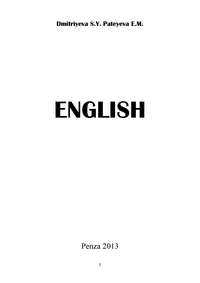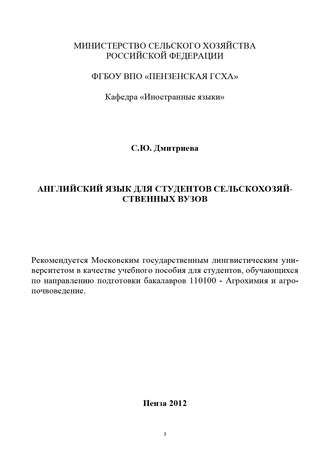
Полная версия
Английский язык для студентов сельскохозяйственных вузов
Специальный вопрос (Special question) это вопрос к какому-либо члену предложения и требует конкретного ответа. Здесь участвует вопросительное слово. Существует два типа специальных вопросов:
– к группе подлежащего (здесь нет вспомогательного глагола. E.g. Who lives in London? )
– к любому другому члену предложения. E.g. Where is Mark?
Вопросительные слова: What? When? Who? Why? Where? How many ( much )? How? Whom? Which? Whose?
Альтернативный вопрос (Alternative question) это вопрос, в основе которого лежит выбор-альтернатива. Здесь участвует союз or. E.g. Do you study English or German?
Разделительный вопрос (Disjunctive question) это вопрос, состоящий из двух частей всегда противоположных друг другу (первая часть – утвердительное или отрицательное предложение, вторая ( Question tag) – переспрос, состоящий из вспомогательного глагола и личного местоимения, заменяющего подлежащее. Переспрос переводится: «не так ли?»). E.g. You don’t like winter, do you? He was there, wasn’t he?
Exercise 2. Put a question tag at the end of each sentence.
1) Ann’s on holiday, …
2) You weren’t listening, …
3) Sue doesn’t like onions, …
4) Jack applied for the job, …
5) He won’t mind if I come early, …
6) He had not seen her before, …
7) She is right, …
Порядок слов в вопросительном предложении
Порядок слов в вопросительном предложении определяется одной схемой, независимо от временной формы глагола-сказуемого.
Рассмотрим пример: We borrow books from the library.

Exercise 3. Put questions of different types to the sentences.
1) He is in the room. 2) We like holidays. 3) They are buying a new computer. 4) She has got three sisters in Moscow. 5) They are not ready today. 6) My flat is on the second floor. 7) Ann didn’t see my report. 8) We see many books on the shelves. 9) Every week Dan writes a letter.
PERSONAL PRONOUNS Личные местоимения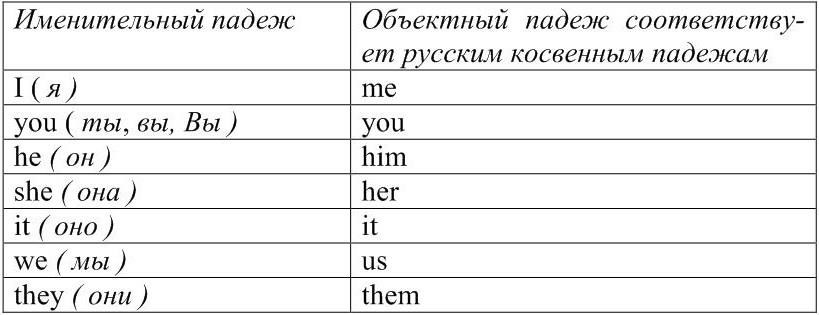
В английском языке глаголы to be, to have, to do являются многофункциональными.
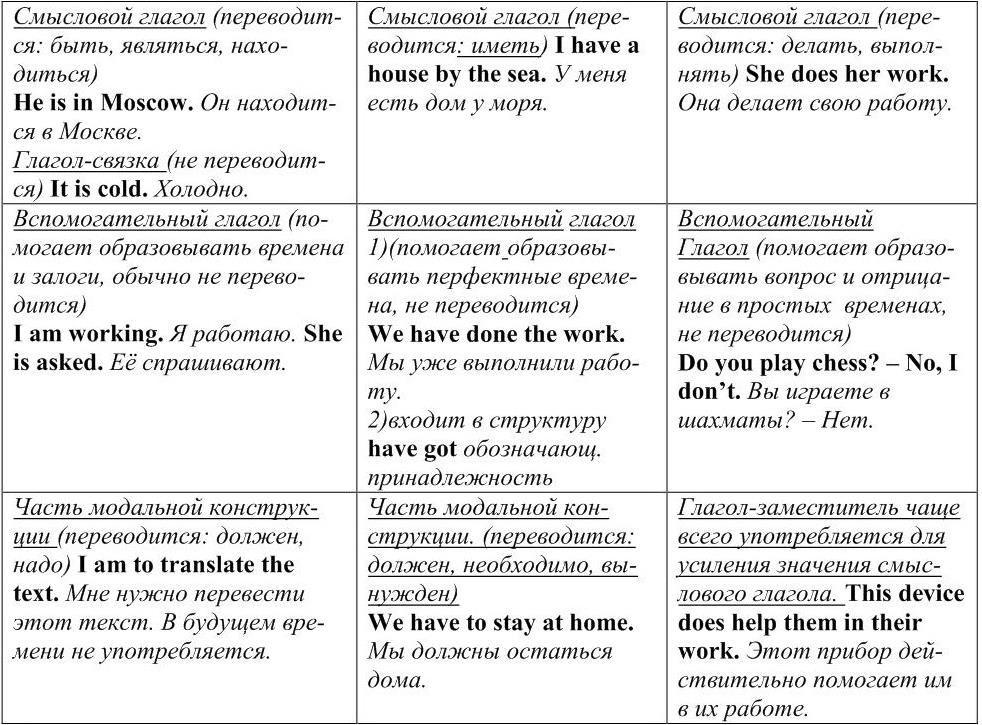
Следует помнить, что модальные конструкции: to be to, to have to имеют одинаковое значение должен, однако с разными оттенками долженствования. E.g. I am to go there. – Я обязан ( должен по плану, по договорённости) поехать туда. I have to go there. – Я вынужден поехать туда ( должен вместо Н., который заболел ).
have, have+got, do+have1Форма have без got и do сохраняется в устной и письменной формах официально-делового стиля. Например:
Have you an appointment?
Однако неосложненное have постепенно вытесняется формами с got и do.
Например:
Have you got the money? ( обладание)
Do you have the money?
I’ve got a new car.
She hasn’t got a car.
He has got a brother. ( родственные отношения)
Устойчивые сочетания на основе глагола haveI have ( got) a cold. – Я простудился.
He has an appointment. – У него назначена встреча.
He has a lesson. – У него занятие.
He has breakfast ( dinner, lunch, …) at 7. – Он завтракает в 7.
to have a swim ( a bath, a shave, a sleep, a day off, a nice evening, a walk, a shower, a rest, a dream, a holiday)
She has a baby. – У нее родился ребенок.
I’ve got an idea. – У меня есть идея.
Вопросы с этими сочетаниями бывают только с do, did.
Eg. Did you have a good holiday?
Exercise 1. Use: am, is, are.
1) He … a student. 2) You … French. 3) I … a teacher. 4) It … a car. 5) Nick … from Glasgow. 6) Ann … a doctor. 7) We … to go there. 8) He … sleeping now. 9) We … in Moscow now. 10) They … invited to the party. 11) Ann … to learn the poem.
Exercise 2. Use: have (got), has (got).
1) We … many relatives in Moscow. 2) They … to study many subjects. 3) She … a good computer. 4) I … done the work. 5) Linda … a brother. 6) David and Mike … to correct all their mistakes. 7) Nick … to water plants. 8) I … a good day.
Exercise 3. Use: do, does.
1) … you like this book? 2) We … this work together. 3)You … not play tennis. – But I … 4) He … his work on time. 5) Julia and Ann … like my cooking! 6) My brother … not want to live in a noisy street. 7) His dog … not play with mine.
Exercise 4. Use: I, you, he, she, it, we, they. Sometimes several variants are possible.
1) … am speaking now. 2) Where are Kate and Jane? … are playing volleyball in the park. 3) … don’t like rain. … brings me in a bad mood. 4) … is not late. … is on time. 5) What color is your new car? – … is white. 6) … have to work in the garden today. 7) … am to stay at home on Sunday. 8) … are to go to Moscow this week. Are … going with us? 9) Mary is playing the piano. … is a good musician.
Exercise 5. Point out the functions of the verbs to be, to have, to do. Translate the sentences.
1) I don’t play chess well. 2) He is an engineer. 3) She has to work this Saturday. 4) We have got a new car. It is blue. 5) Pete is in London. He is to make a report about an agricultural exhibition. 6) Sorry, we are late. 7) They did win all the matches! 8) Why don’t you visit him? 9) He doesn’t do his work. He is in hospital. 10) We have to correct this mistake immediately. 11) Her car is broken. 12) Thanks for everything – we had a great time. 13) Have you ever had your own business? 14) She didn’t pay cash, did she? 15) Let’s have a look at it.
Exercise 6. Translate the sentences.
1) Он не инженер. Он студент. 2) Нам придётся сделать это самим. 3) – Вы делаете утреннюю зарядку каждый день? – Да. 4) – Что она сейчас делает? – Она рисует. 5) – Где ваша машина? – Она в гараже. 6) – У него есть брат? – Нет, у него есть сестра. 7) Тебе предстоит поехать туда. 8) Как у тебя дела? – Хорошо, спасибо. 9) Кто она по профессии? – Повар. 10) – Ты не любишь зиму. – Очень люблю. 11) Она действительно учится водить машину ( to drive a car ).
Exercise 7. Some sentences are wrong. Correct them.
1) I had a garden big near my house.
2) She have a new neighbour.
3) Their house are not very large.
4) We always do our work well and in time.
5) We are to cook dinner.
6) He has to stay at home yesterday.
7) Lived I at the hotel.
8) It is cold, is it?
9) Baltimore is not far from Washington.
10) Be quiet!
11) You knows as much as I do.
12) Who has eaten all the grapes?
LESSON 2
Task 1. Answer the questions.
1) Do you live with your family?
2) Is your family large?
3) How many people are there in your family? Who are they?
4) Do you have any brothers or sisters?
5) Who is the youngest in your family?
6) Who do you look like?
7) Have you got a pet?
8) What is your brother’s (sister’s) hobby?
9) What is your mother’s (father’s) occupation?

Use the phrases: – May I ask you a question?
– Yes, certainly
– Have you got… ( What is your …? What is … hobby?)
– Really?
Task 3. Complete the table.


1. relative [΄relətiv] – родственник; distant/close [΄distənt] [kləus] дальний/близкий
2. to be married [΄mærid] – быть замужем (женатым)
3. to get married – пожениться
4. to be single [΄siŋgl] – быть не замужем (не женатым)
5. to follow family customs [΄k٨stəmz] – соблюдать семейные традиции
6. to take after his (her) mother (father) in character – унаследовать характер матери (отца)
7. to look like smb. – быть похожим на …
8. close – дружный
9. to be bossy [bosi] – любить командовать, быть властным
10. old-fashioned [΄əuld΄fæ∫ənd] – старомодный, старинный
11. to earn [ə: n] money [΄m٨ni] – зарабатывать деньги
12. to take care [kεə] of – заботиться
13. to keep a family – содержать семью
14. to keep house – вести хозяйство
15. leisure [΄leʒə] – досуг; at leisure – на досуге
16. to bring up children – воспитывать детей
17. to spend time (spent, spent) – проводить время
18. mutual [΄mju:tʃuəl] respect – взаимоуважение; to respect – уважать
19. to make up a quarrel [΄kworəl] – уладить ссору
20. to argue [΄a: gju: ] – спорить
21. to be cross with smb. – сердиться на кого-л.
22. to celebrate [΄selibreit] a jubilee [΄ʤu: bili: ] – праздновать юбилей
23. to have (give) a party – устраивать вечеринку
24. pocket [΄pokit] money – карманные деньги
25. to hate doing smth. – ненавидеть (что-либо делать)
26. to enjoy [in΄ʤoi] – наслаждаться
27. to be proud [praud] of – гордиться
28. to be missing – скучать
29. family tree – семейное дерево
30. to get on with smb. – ладить, хорошо общаться
31. to annoy – раздражать
Task 5. Finish up the sentences.
1) My mother has got a sister. She is my …
2) I have got a brother. His wife is my …
3) My aunt’s children are my …
4) I have got a sister. Her son is my …
5) My father has got a brother. He is my …
6) My mother has got a father. He is my …
7) My cousin is fond of …
Task 6. Complete the sentences:
a) I hate it when my sister (brother, nephew…) …
b) I don’t like people who …
c) It realy annoys my mother (dad) when I (my friends, people) …
d) I enjoy …
For ideas: talk too loudly, always arrive late, leave things on the floor, always on the phone, watch sport on TV, driving a car, swimming.
Task 7. Divide the following words into two groups: 1) work 2) hobby ( Can one and the same word go into both groups?)
Swimming, knitting, repairing, reading, dancing, driving a car, working in the garden, translating, computer, cooking.
Task 8. Translate the phrases. Make up sentences with them.
A friend of my aunt, to speak of something, one of them; to operate by hand, to speak by telephone, to sit by the window, a book by Tolstoy; to speak about my family, he is about thirty; to speak to my mother, to write with a pencil, to get on with everybody.
Task 9. Translate the sentences.
1) Моя мама – учитель. 2) Мы с отцом любим футбол. 3) У моей тёти очень много старинных вещей. 4) Аня пошла в мать характером. 5) Моё хобби – компьютерные игры. 6) Моя сестра – экономист. У неё есть малыш. Её свекровь помогает ей с ним. Я тоже люблю моего племянника. 7) Мой дедушка – фермер. 8) Я терпеть не могу готовить на всю семью. 9) Что труднее: зарабатывать деньги или воспитывать детей? 10) Я старшая, поэтому мне приходится улаживать споры. 11) Мы гордимся нашим дедушкой.

a) – Have you got a large family?
– No, my family is rather small: my wife, my only son and I.
– What is your son’s name? How old is he? What is his hobby?
– Not so many questions at once. My son, Alec, is eleven and he is fond of computer games.
b) – Is your family large?
– Not very large. There are four of us: my wife, my two children and I.
– How old are your children?
– My son is fourteen and my daughter is twenty.
– What do they do?
– My son is a schoolboy. My daughter is a student.
– I see.
c) – Do you often see the Browns?
– Yes, I do.
– What do they do?
– Mr Brown is a doctor and works at the hospital all day.
– And what about his wife, Mrs Brown?
– Oh, she isn’t working now. She has a baby.
– I see.
d) – Hi, Mary! Is your son at home?
– Yes, he is. What’s the matter?
– I want to introduce him to my daughter.
– Really? And what does she like doing?
– Well, she likes dancing, singing songs, and going to parties…
– Oh, my son doesn’t like dancing, he doesn’t sing songs and he doesn’t like going out.
– And what does he like then?
– He’s fond of reading, cooking, and working in the garden.

Let me introduce myself. My name is Philip Stanley. I am 40. I am a doctor. I work at a hospital in Liverpool. Liverpool is the biggest city in Lancashire. I like my work very much. I am married. My wife’s name is Linda. She is 32. She is kind and beautiful. She is a teacher at school. Our hobby is working in the garden. Our daughter Nora is 12. She is a schoolgirl. She looks like her mother and takes after her mother in character. Her hobby is dancing.
My parents are farmers. They have got a farm not far from the city. They breed pigs. But best of all they like roses. They have to work from morning till night. I have got many relatives: uncles, aunts, cousins, nephews. We often get together at our parents’ house.
Exercise 1. Read and translate the text.

Use the phrases: You are right (to a certain extent). – Вы правы ( отчасти ).
You are mistaken. – Вы ошибаетесь.
1) Philip Stanley is a farmer.
2) He lives in the biggest city of Lancashire.
3) He is married and has got a son.
4) Linda is a doctor.
5) Linda’s hobby is dancing.
6) Their parents’ farm is far from the city.
7) They breed pigs and rabbits.
8) They are a close family.




Use the words:
To my mind (по-моему); it is difficult to say (трудно сказать); to help each other (помогать друг другу); to get together at one’s parents’ house (собираться в доме родителей); the parents’ attention (родительское внимание); more financial support (больше финансовой поддержки); to receive better education (получить лучшее образование); to feel lonely (чувствовать себя одиноким); to be a burden for smb. (быть обузой); to respect (уважать); to be economical (быть экономным); to earn more money (зарабатывать больше денег); to keep house (вести домашнее хозяйство); to have a strong character (обладать сильным характером); to be a reliable person (быть надёжным человеком).

Прослушайте текст (Unit 1 Text 1 “My Biography”) дважды и постарайтесь понять его содержание. Выполните предложенные задания.
1) Finish up the sentences.
My name is …
My surname is …
I was born in …
But now I live in …
My family consists of … people. They are …
I am a student of … My future specialization is …
My hobbies are …
2) Which of the following statements are false?
He was born in spring.
He was born in a small town.
Now they live in Samara.
His mother is a bookkeeper.
He has got an elder sister. He is a first-year student.
His future profession is connected with automobiles.
English is one of his favourite subjects.
3) Make up a plan of the text and retell it.
PHONETICSБуквосочетания с “e”

!!! Remember [e] treasure, measure, weather, feather, heavy.
Exercise 1. Read the words correctly.
a) seek, feel, geese, feet, deep, bee, seen, wheel, meet, meeting, see, week, green.
b) clean, sea, mean, meaning, deal, speak, speaker, peak, please, reading, stream.
c) near, hear, dear, clear, appear, disappear, nearest, tear, ear, fear, dearest. rear, rearing, gear-box, shear.
d) beer, jeer, deer, severe, mere, here, pioneer, sphere, atmosphere, cheer, steer.
e) head, bread, headed, dead, meadow.
f) grey, Jersey, survey, convey, they, obey, eight, weight, freight.
g) learn, pearl, heard, early, earth, rehearsal.
Чтение согласной “g”

!!!Remember [g] girl, get, give, forgive, gear.
Exercise 2. Read the words correctly.
Page, gun, gentle, gender, germ, grade, huge, give, game, judge, egg, eggs, engine, wing, sing, spring, tank, sink.
GRAMMAR THE ARTICLE АртикльВ английском языке два артикля: определённый (the) и неопределённый (a, an). Артикль – служебное слово, являющееся определителем существительного.
Неопределённый артикль (a, an) употребляется только в единственном числе, когда лицо или предмет не знакомы или употребляются впервые. Имеет значение: один из многих, какой-то, любой.
Определённый артикль (the) употребляется как в единственном, так и во множественном числе а также с неисчисляемыми существительными, когда лицо или предмет знакомы или известны говорящиму, и слушающему.
E.g. Her sister has got a nice house. (Собеседник впервые слышит о доме её сестры). The house faces my office. (Он уже знает, о каком доме идёт речь, т. е. о ранее упомянутом доме её сестры).
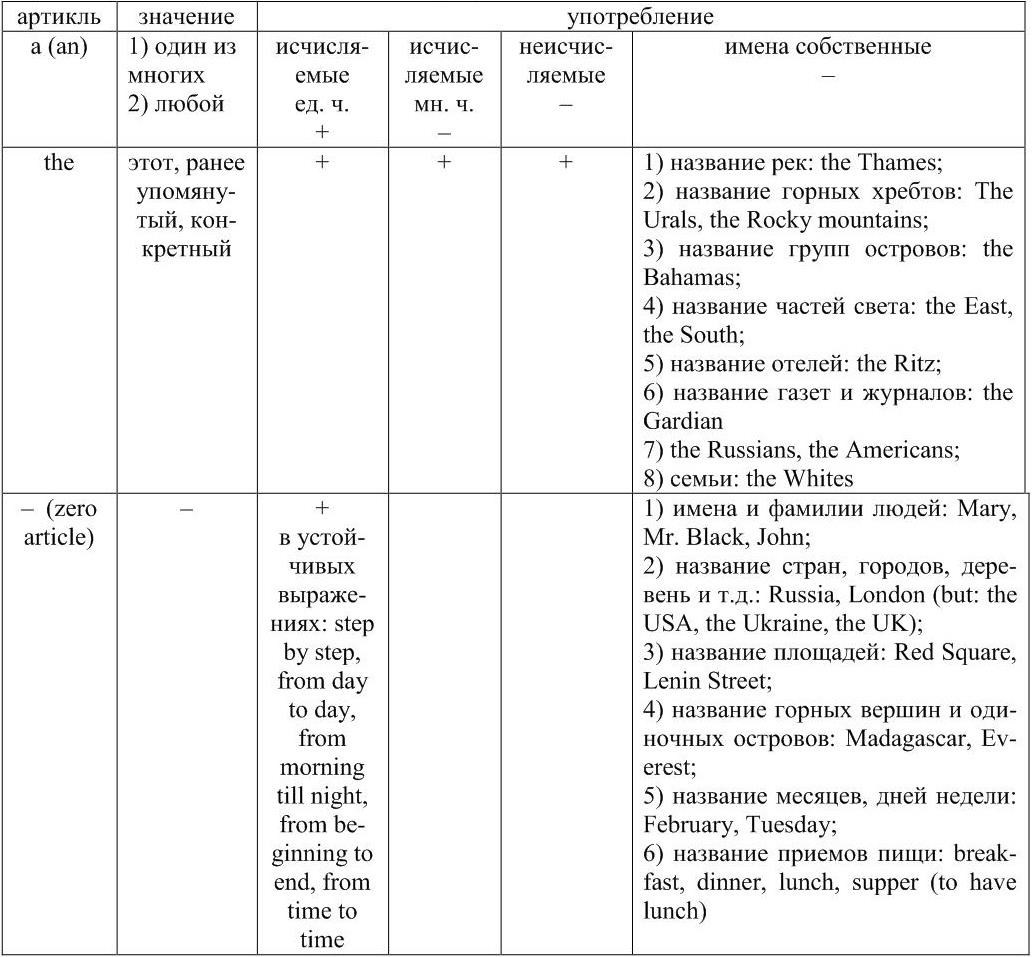


а) порядковое числительное: the first day;
б) прилагательное в превосходной степени: the best friend;
в) слова: wrong, right, same, only: the wrong size

Exercise 1. Put in a, an, some or nothing. Sometimes some variants are possible.
1) Have you got … camera?
2) Would you like to be … actor?
3) Do you collect … stamps?
4) Tom always gives Ann … flowers for her birthday.
5) What … beautiful garden!
6) … birds cannot fly.
7) When I was … child, I used to be shy.
8) Jane is … teacher.
9) You need … visa to visit … foreign countries.
Exercise 2. Put in a or the or nothing.
1) I am looking for … job.
2) Close … door, please.
3) We live in … small flat in … center of … town..
4) This is … nice house. Is there … garden near it?
5) … Soviet Union is … first country to send … man into space.
6) … longest river in Great Britain is … Severn.
7) When do you have … dinner?
POSESSIVE PRONOUNS Притяжательные местоименияПритяжательные местоимения выражают принадлежность и отвечают на вопрос чей? чья? чьё? чьи?
Притяжательные местоимения имеют две формы:
1) простую (или зависимую, т. е. после неё следует существительное, возможно с прилагательным)
E.g. My book; my new book.
2) независимую (употребляется самостоятельно, подразумевая ранее упомянутое существительное)
E.g. I have no pen. Give me yours, please.

Exercise 1. Complete the chain.
a) I – … – mine
b) … – his – his
c) she – her – …
d) we – … – …
e) … – … – yours
f) … – their – …
Exercise 2. Choose the correct variant.
1) I’ve left … pen, give me … (yours, your, my, mine), please.
2) Is … family large? ( your, yours)
3) Mr. Brown and Mrs. Brown have got two children. Both … children are boys. ( their, theirs)
4) … profession is more interesting than … ( hers, his,)
5) I don’t like … pencil, please, give me … ( my, your, yours)
6) Whose aunt is in the hall? – … ( mine, my)
7) We are French and … friends are English. ( our, ours)
8) … daughter has a dog. … nose is long. ( its, her, mine, my)
Exercise 3. Replace the personal pronouns by the corresponding possessive pronouns.
1) ( We) table is near the window.
2) I have some books in ( I) bookcase.
3) ( She) family is in London now.
4) Those are ( they) instruments.
5) This is a table. ( It) surface is equal to 4 square meters.
6) ( I) mother is a doctor. 7) ( We) family is small.
PREPOSITIONSПредлоги

Exercise 4. Use the right prepositions.
1. She is … thirty.


